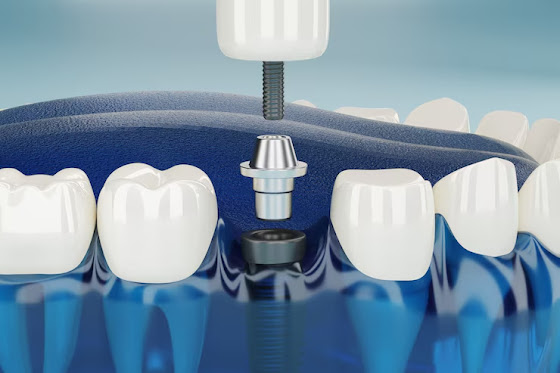Dental implants are a popular and effective solution for replacing missing teeth, offering a natural look and long-lasting durability. Unlike traditional dentures or bridges, dental implants are surgically placed into the jawbone, providing a stable foundation for artificial teeth. This article explores what dental implants are, how they work, and the benefits they offer.
What Are Dental Implants?
A dental implant is a small, screw-like post made of biocompatible materials such as titanium. It serves as an artificial tooth root, which is surgically implanted into the jawbone. Once the implant integrates with the bone, it provides a secure base for a dental prosthesis, such as a crown, bridge, or denture.
Dental implants come in various types, including:
Endosteal Implants: These are the most common type and are placed directly into the jawbone.
Subperiosteal Implants: These sit on top of the jawbone and under the gum tissue, used for patients with insufficient bone height.
The Process of Getting Dental Implants
The journey to receiving dental implants typically involves several stages and requires collaboration between a dentist, oral surgeon, or periodontist. Here’s a step-by-step breakdown:
1. Initial Consultation and Evaluation
The process begins with a comprehensive dental examination. Your dentist will evaluate your oral health, jawbone density, and overall medical history. X-rays and 3D imaging may be used to assess whether you are a suitable candidate for dental implants.
2. Bone Grafting (if necessary)
If your jawbone is too thin or soft to support an implant, a bone graft may be required. This procedure involves adding bone material to strengthen the area, ensuring a sturdy foundation for the implant.
3. Implant Placement
During this stage, the dental implant is surgically inserted into the jawbone. The procedure is typically performed under local anesthesia, though sedation may be used for patients with dental anxiety. Once placed, the implant is left to heal and fuse with the bone through a process called osseointegration, which can take several months.
4. Abutment Placement
After the implant has successfully integrated with the bone, an abutment is attached. This small connector piece sits above the gumline and serves as the anchor for the replacement tooth.
5. Prosthesis Attachment
Finally, a custom-made crown, bridge, or denture is secured to the abutment. The prosthesis is designed to match the size, shape, and color of your natural teeth, ensuring a seamless appearance.
How Do Dental Implants Work?
Dental implants mimic the function of natural teeth by acting as artificial roots that bond with the jawbone. This integration creates a stable base that prevents the prosthetic tooth from shifting. The implant’s design and placement help distribute biting forces evenly across the jaw, preserving bone density and preventing further bone loss.
Additionally, dental implants support the surrounding teeth by maintaining the structure and alignment of your dental arch. They also stimulate the jawbone, promoting healthy bone growth and preventing the sunken appearance that often accompanies tooth loss.
Benefits of Dental Implants
Dental implants offer several advantages over traditional tooth replacement options:
Natural Appearance: Implants are designed to look, feel, and function like natural teeth, enhancing your smile and confidence.
Durability: With proper care, dental implants can last a lifetime, making them a cost-effective solution in the long term.
Improved Oral Health: Unlike dental bridges, implants do not require altering adjacent teeth, preserving the natural structure of your mouth.
Enhanced Comfort: Implants eliminate the discomfort and inconvenience of removable dentures, allowing you to eat, speak, and smile with ease.
Bone Preservation: By stimulating the jawbone, implants prevent bone loss and maintain facial structure.
Convenience: Dental implants do not require special adhesives or daily removal, making them easy to care for with regular brushing and flossing.
Who Is a Candidate for Dental Implants?
While dental implants are suitable for many people, certain factors can influence candidacy, including:
Adequate Bone Density: A strong jawbone is essential for supporting the implant.
Healthy Gums: Good oral hygiene and the absence of gum disease are crucial.
Overall Health: Chronic conditions like diabetes or habits such as smoking may affect healing and implant success.
Patients with insufficient bone or health concerns may still qualify for implants after undergoing preparatory treatments, such as bone grafting or gum therapy.
Caring for Dental Implants
Proper care is vital for the longevity of dental implants. Here are some tips to maintain them:
Brush and floss regularly to prevent plaque buildup.
Visit your dentist for regular checkups and professional cleanings.
Avoid habits like chewing on hard objects or using your teeth as tools, which can damage the prosthetic.
Quit smoking to enhance healing and implant success rates.
Conclusion
Dental implants are a revolutionary solution for replacing missing teeth, offering unparalleled stability, functionality, and aesthetic appeal. Whether you have lost a single tooth or need full-mouth restoration, implants can restore your smile and improve your quality of life. If you’re considering dental implants, consult a qualified dental professional to determine if they’re right for you. By investing in this advanced dental technology, you’ll enjoy a confident smile that lasts a lifetime.
For More Click Here:- https://www.buymeacoffee.com/pinnacledental



